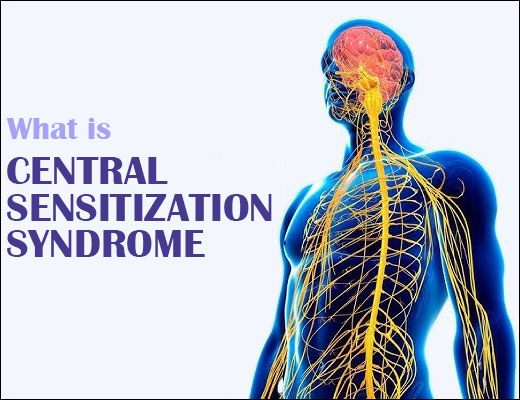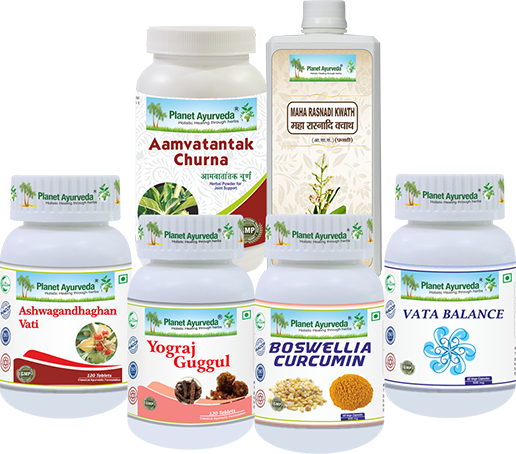Central Sensitization Syndrome And It’s Treatment In Ayurveda
Abstract
The central nervous system of the body helps in managing the whole body functions effectively. The central nervous system of the body contains the brain and spinal cord. It helps in receiving sensory information, processing the information and passing the motor information to the organ in response to the received information. The central nervous system manages all the things like feelings, emotions, learning etc. Any deformity in the normal functions of the nervous system leads to disease conditions. Central sensitization syndrome is one such condition which includes the nervous system. As the name “Syndrome” indicates, it is a group of illnesses which include many symptoms like fatigue, pain and many more. In this article, we are going to study Central Sensitization Syndrome in detail. Let’s start!

Introduction
Central sensitization syndrome (CSS) is a condition in which the nervous system of the body is affected. Central sensitisation syndrome is the hypersensitivity to external stimuli which is not usually painful. In this condition, the nerve signals from the central nervous symptom are intensified, due to which the person feels more pain than usual. The individual in this condition becomes hypersensitive to the stimulus and feels more pain, such as the feeling of clothes against the skin. The individual feels pain even after the stimulus is removed. In this article, we are going to study causes, signs and symptoms, diagnosis, Ayurvedic overview, Ayurvedic treatment and diet for this condition management. Also, we study the herbal remedies of Planet Ayurveda for Central sensitization syndrome.
Causes of Central Sensitization Syndrome
The condition of Central sensitization syndrome is usually caused by any type of physical changes in the nervous system of the body. Following are some of the common factors which are responsible for these conditions are:
- Any injury to the brain or spinal cord
- Brain surgery
- Inflammation
- Infection
- Epilepsy
- Stroke
- Brain cancer
Apart from this, there are certain factors that may increase the risk of this condition. These may be chronic pain conditions like arthritis, any family history
Signs of Central Sensitization Syndrome
Central Sensitization Syndrome is a chronic condition that causes a variety of signs. Some of the common signs of this syndrome may include:
Symptoms of Central Sensitization Syndrome
Central Sensitization Syndrome can be characterised by a range of symptoms that may vary from patient to patient. Some of the common symptoms are:
- Pain
- Fatigue
- Lack of concentration
- Anxiety
- Irritability
- Depression
- Sensitive to odours, sound or light
- Dizziness
- Disturbed sleep
- Weakness
Diagnosis of Central Sensitization Syndrome
There is no exact diagnostic test for the diagnosis of central sensitization syndrome. Some tests can be done to rule out the other conditions associated with this condition. Some of these tests may be as follows:
- X-rays to diagnose muscle, joint or bone injuries that can cause pain.
- Blood tests to check infections that may cause pain such as in Rheumatoid arthritis.
- Electroencephalography (EEG) to assess any brain abnormalities.
- Magnetic resonance imaging (MRI) to check the specific region associated with pain.
Ayurvedic Overview of Central Sensitization Syndrome
Central sensitisation syndrome is a condition in which the person is hypersensitive to external stimuli. The affected person feels more pain than usual. According to Ayurveda, the condition of Central Sensitization Syndrome can be correlated with an imbalance of Vata Dosha. The aggravated Vata dosha leads to an increased sensitivity to stimuli and pain perception. The vitiated Vata Dosha governs the nervous system and leads to the development of Central sensitisation syndrome. Vata imbalance causes an increase in the peripheral nerve’s sensitivity that leads to the amplification of pain.
Diet for Central Sensitization Syndrome
- Vegetables like spinach, cabbage, sweet potato, green beans, beetroot, broccoli etc.
- Fruits like pomegranate, peaches, papaya, apple, banana, plum etc.
- Use of cow ghee and olive oil
- Dry fruits like almonds and walnuts
- Intake of Old grains, brown rice, barley etc.
- Spices like cumin, coriander, turmeric, ginger, fennel etc.
Ayurveda Management of Central Sensitization Syndrome
The condition of Central Sensitization Syndrome is correlated with the imbalance of Vata Dosha. So, the herbs that help in the Balancing of Vata dosha are used in this condition. Some of the single herbs that can be used in this condition are Turmeric, ginger, Ashwagandha, liquorice etc.
Panchkarma for Central Sensitization Syndrome
- Shirodhara – The word Shiro means head and Dhara means flow or stream. In this therapy, warm medicated oil or water is continuously poured on the forehead creating a soothing sensation. This therapy helps to promote relaxation in the mind and improve sleep quality. This therapy helps balance the doshas in the body. It helps in balancing Vata dosha in central sensitization syndrome and provides calming effects to the nervous system. It reduces the volatile qualities of Vata and nourishes the mind.
- Abhyanga – It is a form of ayurvedic therapy that involves the massage of the entire body from head to toe with medicated oil. The Vata dosha is characterised by dryness and coldness. In Abhyanga, the massage with medicated oils helps in balancing Vata dosha due to its warming and nourishing properties. Abhyanga helps to improve blood circulation and provide relief from the pain in central sensitization syndrome.
- Nasya – Nasya is an Ayurvedic therapy that involves the instillation of herbal oils, juices and powders through the nasal route. Nasya helps balance Vata dosha and reduces pain. It helps in the management of stress, anxiety and other neurological conditions.
Herbal Remedies for Central Sensitization Syndrome by Planet Ayurveda
Planet Ayurveda is a global brand that manufactures a number of herbal formulations to treat almost all health problems. It provides a wide range of herbal formulations in the form of tablets, capsules, decoction, oils, powder, asava, arishta etc. For manufacturing any formulation, proper precautions and guidelines are followed by Planet Ayurveda experts. Each and every formulation is formed after a number of tests and trials. Herbs used in the formation of medicines are highly effective. Here we are going to discuss some of the Planet Ayurveda medicines that are highly effective in the treatment of central sensitization syndrome and These are Ashwagandha Ghan Vati, Boswellia Curcumin, Aamvatantak Churna, Maharasnadi Kwatha, Vata Balance and Yograj Guggul.
- Ashwagandha Ghan Vati
- Boswellia Curcumin
- Aamvatantak Churna
- Maharasnadi Kwath
- Vata Balance
- Yograj Guggul
Products Description
1. Ashwagandha Ghan Vati
The main ingredient of this formulation is Ashwagandha (Withania somnifera). Ashwagandha helps enhance the resistance to stress and promotes sleep. Ashwagandha is a very effective herb that contains anti-stress, mind-boosting and antioxidant properties. This herb helps in balancing Vata dosha in the body. It also contains anti-inflammatory properties, immunity- booster and relieves pain.
Dosage: 2 tablets twice a day after meals.
2. Boswellia Curcumin
This formulation of Planet Ayurveda contains Shallaki (Boswellia serrata) and Haridra (Curcuma longa). This herbal medicine is very effective in the management of pain. It contains anti-inflammatory and analgesic properties. It also contains neuroprotective properties and potentially helps to alleviate pain associated with central sensitization syndrome.
Dosage: 1 capsule twice daily after meals.
3. Aamvatantak Churna
This Ayurvedic formulation contains Ashwagandha (Withania somnifera), Fenugreek (Trigonella foenum graecum), Haridra (Curcuma longa), Sonth (Zingiber officinale) and many more. Ashwagandha helps in relieving pain, stress and inflammation. It is effective in Vata disorder and helps in weakness and fatigue management. Fenugreek in this formulation helps in relieving inflammation and painful conditions due to Vata dosha. Hardira has anti-inflammatory and pain-relieving properties. Sonth or dry ginger is a potent painkiller as well as an anti-inflammatory herb. Gorakhmundi helps in relieving pain. Suranjan is effective in inflammation, pain and improves metabolism.
Dosage: 1 tsp twice daily with warm water.
4. Maharasnadi Kwath
This formulation contains Rasna (Pluchea lanceolata), Devadaru (Cedrus deodar), Vacha (Acorus calamus), Ginger (Zingiber officinale), Haritaki (Terminalia chebula) and many more. Maharasnadi kwatha is a very effective herbal formulation of Planet Ayurveda for Vata disorders. It helps in the management of pain and inflammation due to vata imbalance. It provides calming effects to nerves that help in reducing pain and promote relaxation.
Dosage: 2 tsp twice daily after meals.
5. Vata Balance
Vata balance capsules of Planet Ayurveda is a very effective herbal formulation that contains Bilwa (Aegle marmelos), Patla (Oroxylum indicum), gokshur (Tribulus terrestris), Kantkari (Solanum surattense) and many more. All the ingredients in this formulation help in balancing Vata dosha and are also effective in pain relief. This formulation has miraculous effects in the management of all types of Vata disease.
Dosage: 1 capsule twice daily after meals.
6. Yograj Guggul
Yograj Guggul of Planet Ayurveda contains Pure Guggulu (Commiphora mukul), Chitraka (Plumbago zeylanica), Pippali (Piper longum), Jeeraka (Cuminum cyminum) and many more. It is a very effective formulation for pain and inflammation management. It helps in relieving fatigue and weakness. It is a very useful formulation in Vata as well as kapha disorder management.
Dosage: 2 tablets twice daily after meals.
Conclusion
Central Sensitization Syndrome (CSS) is a condition related to the nervous system in which the person is hypersensitive to any external stimulus. The patient in this condition feels more pain in contact with any stimulus which is not usually painful. The nerve signals in this condition are intensified causing more pain and sensitivity to any external stimulus. In this article, we already studied all the causes, signs, symptoms and management of this disorder. In this condition, there are many herbs in Ayurveda that help in the management of the symptoms of this condition. There are many therapies in Panchkarma that help in the management of this disorder very effectively. Many herbal formulations of Planet Ayurveda that can be used for the management of this condition very effectively are already discussed in this article. So, one can manage this condition by using herbal formulations, panchkarma and following a diet properly.


